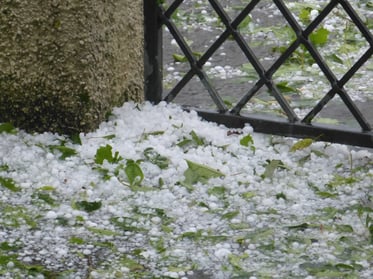
When April hailstorms blew through Wylie, Texas recently, softball-sized hail destroyed windshields and tore holes in the roofs of nearby homes and businesses. You couldn’t watch the local news without images of shattered glass, gaping holes and blue tarps gracing the roofs throughout Wylie neighborhoods.
What didn’t make headlines was the less visually compelling damage sported by HVAC condensers, heat pumps and rooftop package units sitting outside.
All outdoor units have metal condensing coil fins, which are about the same thickness as a soda can. Hail can easily smash and flatten the fins together and block airflow across the condenser coil. This can lead to compressor failure, impede performance and increase energy costs.
When Hail Passes Through, Don’t Forget to Check Your HVAC Unit
According to Frymire Services Residential Service Manager Stevie McCown, building managers and homeowners should take time to inspect outdoor units for damage following any big storm.
“From a visual standpoint, you should look for the obvious. Dents and dings on the tops of panels for example. Also, the coils typically only have a cage around them, which provides no protection, so you may notice dings and dents on the coil. Fan motors and blades can also sustain damage. If the unit is still running, listen for any unusual noises you haven’t heard before,” Stevie says.
Hail and high winds can also lead to some not-so-obvious problems with outdoor HVAC units.
Ask an HVAC Pro to Inspect the System for Refrigerant Leaks
As Stevie explains, “While it may appear your air conditioning is running just fine, large hail can cause refrigerant leaks, and so can high winds. The unit is attached by copper lines, and wind can actually move the entire unit, leading to an issue inside the wall where the refrigerant lines get kinked.”
Kinked lines and leaks restrict refrigerant flow and can cause your HVAC system to work harder and run longer. This can lead to equipment failure and higher electric bills. Contact an experienced HVAC services professional in Dallas or Fort Worth to inspect your equipment thoroughly.
Get a Second Opinion and Quote on HVAC Repairs
Insurance adjusters don’t always get it right. If you live or operate a business in Wylie (or another storm-ravaged area), and your insurance company has inspected your HVAC equipment (or will be soon), it’s also a good idea to get a quote from an experienced HVAC services and repair provider in Dallas – Fort Worth.
As Stevie puts it, “Get a second opinion when it comes to insurance estimates. You want to make sure that the amount the insurance company allots you will be enough to repair or replace your damaged equipment.”
Plus, if your HVAC equipment is still covered by a warranty, it’s important to repair or replace air conditioner or heat pump components according to manufacturer guidelines.
“You should also hire an HVAC contractor who is authorized by the manufacturer to repair or replace your A/C unit or heat pump. Otherwise, those repairs may void any warranty coverage you have remaining,” Stevie says.
Learn more about the unexpected risks of price shopping for home repairs in this recent post.
If you suspect severe weather, like hail and high winds, may have damaged your A/C condenser, heat pump or rooftop unit, it’s best to call a reputable HVAC contractor to assess the system for any damage. They can inspect your HVAC system as a whole and advise you whether it’s best to repair or replace the damaged components.
For Air Conditioner, Heat Pump or HVAC Rooftop Unit Repair in the Dallas – Fort Worth Metroplex …
Give Frymire Services a call at 1-877-FRYMIRE (379-6473). We’ve been servicing residential and commercial HVAC needs since 1950 and are happy to answer your questions about hail damage at your home or business.
And Don’t Get Scammed by Fly-By-Night-Contractors (HVAC, Roofing or Otherwise)!
When high temps kicked in last year, Stevie weighed in on HVAC scams to watch out for and how to find a reputable HVAC contractor. Read this past post, 5 Telltale Signs Your HVAC Contractor Isn't Legit, and Why You Should Care, to learn more.
Photo Source: Pixabay